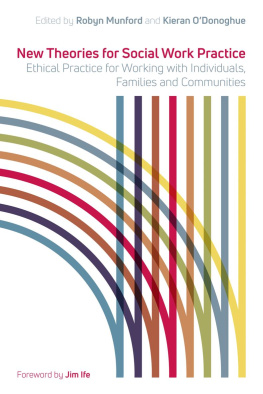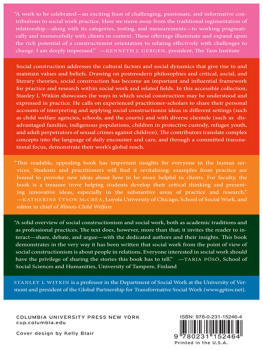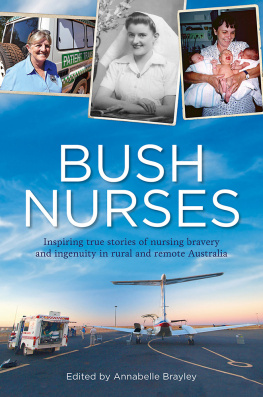
Rural, Regional and Remote Social Work
This book gives voice to the direct practice experience of social workers working in rural and remote contexts using Australia as the primary case-study. The authors undertake a qualitative research project, conducting in-depth interviews to examine social work theory and practice against the reality of rural and remote contexts. Practice examples provide the reader with an insight into the diverse and complex nature of social work in rural and remote Australia and the role of contemporary social work.
Through placing rural and remote social work in its historical, theoretical and geographical contexts, this work explores a range of considerations. These include isolation; ethical dilemmas when working with small and closely-linked communities; climate, disaster relief and the environment; community identity and culture; working with indigenous communities in remote contexts; and social work education.
Based on direct practice research, this book challenges existing theories of practice and reframes those to reflect the reality of practice in rural and remote communities. As social work must continue to critically reflect on its role within an ever changing and individualistic society, lessons from rural and remote settings around engagement, sense of place and skillful, innovative practice have never been more relevant.
Amanda Howard is course convener and head of discipline in the social work program at the University of Newcastle, Australia.
Meaghan Katrak is undergraduate coordinator and lecturer in social work at the Australian College of Applied Psychology, Australia and conjoint fellow at the University of Newcastle, Australia.
Tamara Blakemore is lecturer at the University of Newcastle, Australia.
Phillip Pallas teaches at the University of Newcastle, Australia.
Rural, Regional and Remote Social Work
Practice Research from Australia
Amanda Howard, Meaghan Katrak, Tamara Blakemore and Phillip Pallas
First published 2016
by Routledge
2 Park Square, Milton Park, Abingdon, Oxon OX14 4RN
and by Routledge
711 Third Avenue, New York, NY 10017
Routledge is an imprint of the Taylor & Francis Group, an informa business
2016 Amanda Howard, Meaghan Katrak, Tamara Blakemore and Phillip Pallas
The right of Amanda Howard, Meaghan Katrak, Tamara Blakemore and Phillip Pallas to be identified as the authors of this work has been asserted by them in accordance with sections 77 and 78 of the Copyright, Designs and Patents Act 1988.
All rights reserved. No part of this book may be reprinted or reproduced or utilised in any form or by any electronic, mechanical, or other means, now known or hereafter invented, including photocopying and recording, or in any information storage or retrieval system, without permission in writing from the publishers.
Trademark notice: Product or corporate names may be trademarks or registered trademarks, and are used only for identification and explanation without intent to infringe.
British Library Cataloguing in Publication Data
A catalogue record for this book is available from the British Library
Library of Congress Cataloguing in Publication Data
Names: Howard, Amanda, 1967 author.
Title: Rural, regional and remote social work : practice research from Australia / by Amanda Howard, Meaghan Katrak, Tamara Blakemore and Phillip Pallas.
Description: Farnham, Surrey, UK; Burlington, VT : Ashgate, 2016. | Includes bibliographical references and index.
Subjects: LCSH: Social service, RuralAustralia. | Social service PracticeAustralia. | Rural populationAustralia.
Classification: LCC HV473.H69 2016 | DDC 361.3/20994dc23 LC record available at http://lccn.loc.gov/2015040004
ISBN: 9781472454416 (hbk)
ISBN: 9781315607238 (ebk)
Typeset in Bembo
by Out of House Publishing
When I was asked to write the introduction to this well-researched and crafted book on rural and remote Australian social work practice, my immediate and enduring thoughts brought me back to the very essence of Bush Practice, which involves appreciating the history, changes and conflicts across and within communities, their resilience and their unbridled strength in creating beautiful services that actually reach out, support and respond to communities needs.
This book does create a sense of the emergence of both the personal and collective aspects of Australian rural social work. Importantly, it has personality and can be enjoyed by all, whether it be around the campfire with the billy boiling, alongside the log book of our stock hauler, during a smoko in shearing season, hauling pearls from their beds in Northern Australia or travelling by train to ones campsite. One can feel and be transported by a gentle breeze to these rural/remote communities.
I think of the significance of the social changes that have happened, and which are still happening and will continue to happen across rural/remote communities: from lone practitioners working unsupported to the development of regional social work courses. I think of the increasing conflicts between large companies and rural communities intent on keeping agricultural communities vibrant; the importance of the recently launched Ripple Effect by the National Farmers Health Centre in advancing rural/remote communities responses to suicide; the difficulties that Aboriginal communities have faced and those Aboriginal communities where women have emerged as inspirational leaders for the next generation.
In particular, I remember quite a few years ago, my great mate Skinner, needing to take care of family business, said to me, I need you, Martie, to take my Missus to Adelaide.
This honour has stayed with me.
It was a fair drive across tracks of bulldust, with his lovely wife, Maxine, swag of kids, Ringer, his dogs and family. Nothing unusual. Along our journey we were just another family moving across stations. As we got to the city life, there was an uncomfortable change. When we pulled in to service up, not an issue in the bush, the closer we came to the townships, the more glaring were the differences in attitude. You see, this family is black; I am white. Maxine has gone on to be an inspiration both to her own children and to women within Aboriginal communities.
I feel that today we would be more welcomed in some of the towns we passed through than we were then.
I also think of the changes that have occurred through drought, flood and bushfires, and how communities have responded with a determination and a rousing call to overcome seemingly impossible situations. This book offers so many insights into the personality of rural practitioners and their communities.
Rural social workers are diverse in how they apply their trade, passionate leaders who may sometimes be controversial but do actually get things done. Through their skills, they generate forums where discussions are navigated thoughtfully, and in doing so, the strength of the local communities can be harnessed in addressing the tasks that need to be done.
This book provides a much-needed opportunity to reflect on the significant achievements of rural/remote social work. Meaghan and Amanda, and Tamara and Phill have crafted a pathway which adds to the readers knowledge and which is not based on a set ideology. Rather, the book provides an essential insight into how rural social workers are both flexible and capable managers of situations that may appear daunting to others.






